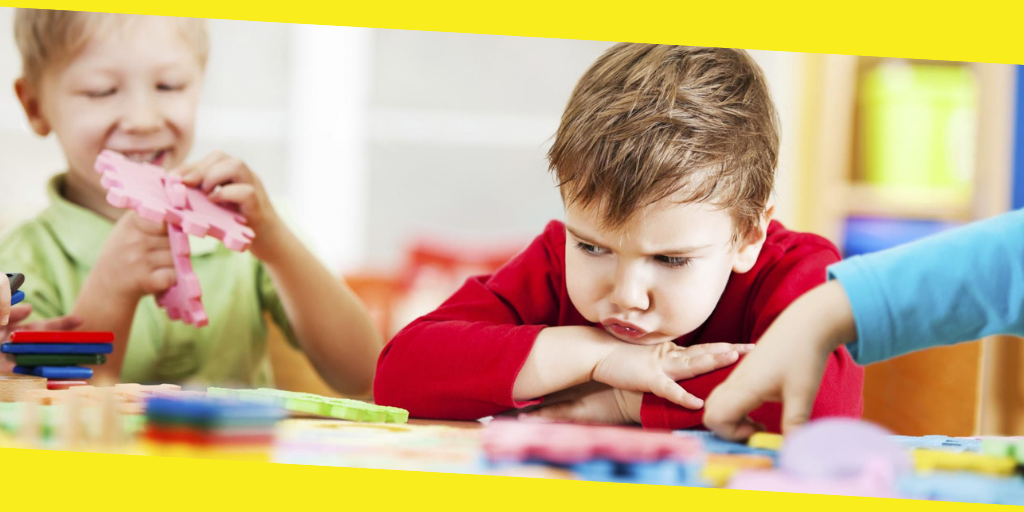Top 10 Effective Strategies To Manage Kids/Toddlers Tantrums
This post was last updated on September 6th, 2019

Toddlers and small kids have a tendency to come up with their tantrums at the most unexpected times when you are busy or having a crisis situation. In such times, you are left with no alternative but to give in to what they demand which in the long run can make them more demanding and stubborn. More often, the reasons for those hysterical screams and an intense storm of emotions is just a silly thing which you can of course fulfill. But making it a habit of saying yes to their every demand can be dangerous as they grow up.
Here are the top 10 effective strategies that you can put to use for managing toddlers/kids tantrums:
1. Preventing Tantrums
It is always a good thing to stop a problem before it turns up. In the case of toddlers, you have multiple options to ensure that they become less demanding. And all it requires is spending quality time with them, giving your young ones the attention they want for healthy and confident growth. Setting aside regular playtime for your toddler or a preschooler, letting him take the lead during playful activities and giving him all of your attention will make him calmer, positive. So the next time he is having a bout of an emotional storm, he will be much good-behaved and understanding.
2. Ignore Him
For a sensitive mother or father it can be a bit harsh but when your kid is throwing tantrums start ignoring him unless he becomes violent or is endangering himself physically. When you take away your attention completely from the child, it is sort of not reinforcing his undesirable behavior. In the case your child starts kicking, biting or hitting or even start throwing things, remove him from the situation and stop him. Tell him firmly, that hurting others or even himself is not acceptable at all. Take away a privilege or a thing from him that he likes most to make sure that he understands that hurting is not at all acceptable.
3. Be Softer To His Louder Yell
Well, who said taking care of kids tantrums is an art is 100% correct. When your child is in a bad mood, he but certainly yells and shouts loudly. Most parents shout louder to stop him from screaming or crying. But it does not work. Rather you should take a cooler approach. The more loudly he yells, the softer should be your voice. Tantrums are a way of kids to make you notice them and to fulfill their demand. But once they kind of get to know that their strategy is not working, they will stop attracting you in this way.

4. Understanding Reason Behind Tantrum
As the preschoolers and toddlers struggle to find words and create sentences to tell you their needs and demands you will slowly get to understand the exact reason behind their tantrums. It, however, does not mean that they will stop stalking you with their emotional unexpected jolts. It is the age when children are trying to understand their emotions and learn to handle themselves in social company.
So, the process will involve some hi-cups in between and even a minor disagreement can lead to a full and quick turn on. More often it is because your child wants to do something on his own and finds incapable of doing so. He will need your help but cannot say so properly. In such a case you should be attentive towards what he is trying to do, like tying a shoe-lace or putting on the socks. Your approach should be such that the child does not feel like you are in any way helping him out but you ultimately ensure that he completes the task successfully with your cooperation.
5. Distracting With Simple Choices
Many times you as an experienced parent can understand that a tantrum is forming and will blow up soon. You can stop the storm by promptly alleviating the tantrum by addressing the issue beforehand. For example, if your child is not inclined to have dinner, you can distract him by giving him choice to either eat the vegetables or the sweets first instead of forcing him to eat. When a small child is given options, his brain activates and gets engaged in choosing either of the choices and he forgets his anger. Another way is to distract by giving another exciting thing like a toy or singing a silly song or more.
At this age, kids are curious and their logical brain needs more food and something to think. When you give them options, they easily forget what they were crying for.
6. Restoring Balance
It is possible to restore the emotional balance of a child by holding or hugging him. Most of the kids need love and attention which is the rudimentary reason why they become so demanding or emotional. At this age, they do not know the cravings caused due to hormones. When you hug or hold a child it activates the calming system of his body by triggering a feel-good chemical (oxytocin) that is good at regulating emotions.
Apart from that, positive acknowledgments and words are good enough to make the children feel safe and understood. Sympathy and attunement of parents to the child’s feelings soothes his emotions.
7. Never Opt For Punishment
Kids are innocent and uncanny. They do not do anything according to plan or manipulate things or act diplomatically. They will throw a tantrum only when they are in pain or are hurt. So always consider that a tantrum indicates that the toddler wants something. However, if he feels that you are not attending to his problem and is pre-occupied, it can elevate to a strong hormonal storm. For a toddler, it is his only weapon as well as a means of expression. More often, your child is in uncontrollable anguish and pain. That is why you must always try to understand his issues and attend to them but never opt for punishment.
If a child finds out that his emotional outburst leads to parental punishment or anger, he may become defiant or compliant which will affect his emotional growth.
8. Improve His Vocabulary/Ways To Express
When your child is settled after an outburst, try to understand the problem behind his tantrum and teach him the right words so that he can express better the next time. If he cannot pronounce those words, you can teach him certain sign languages which will help you understand his problem immediately. Teach him how to convey his feelings with words and signs instead of throwing things around or crying loudly.
9. Observing Trigger-offs
One of the best ways to prevent tantrums is to observe and find out what triggers off his tantrums. Does he hate to eat certain things that you feed him or he does not like being with certain people that come to your place regularly? There can be so many things that can give him a bout of emotional outburst. You can avoid such things in his vicinity to make him feel happier and comfortable.
10. Give Him Space
Experts believe that you should give your child some space. Sometimes it is good for him to be angry, vent out his frustration. It is quite okay if you take this approach so that he learns to vent out his frustration in a nondestructive way.
You may like this
Recommended For You
Children Learning: Top 5 Reasons To Learn Languages
Sangati Jogwar
Sangati is a writer, poet, voracious book reader, singer, movie-buff and critic. Loves to discuss, interact and have a strong belief in spirituality.




